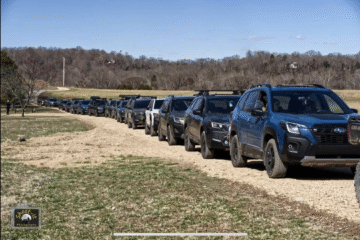The Salvation Army is one of the most ubiquitous signs of any holiday season.
Whether it’s the organization’s Christmas bell ringers or its Angel Trees, the Salvation Army is synonymous with Christmas in Nashville and across the country.
But, Majors Bill and Stephanie Mockabee want people to know that there’s much more to the Salvation Army than its most visible symbols; the organization, its churches and its social services work everyday to alleviate poverty and make life better for the “least of these.”
That work in Nashville, they said, is vital to help the community and its most vulnerable members.
A Calling to the Salvation Army
The Mockabees became Area Commanders of Nashville’s Salvation Army in 2024, but their entire lives have been molded by the church.
Bill’s parents were Salvation Army officers who are now retired in Texas; he was born in Mobile, Alabama and grew up across the South as his parents moved to different appointments. Stephanie was born in Wheeling, West Virginia and attended a Salvation Army church. They met at a Salvation Army camp, stayed involved in divisional activities, fell in love, and then married when they were just 18.
Seven years into their marriage, the Mockabees decided to pursue a career with the Salvation Army and spent two years at the Salvation Army Training College in Atlanta. At the end of that training, they were ordained as ministers in the church and began their work.
Before coming to Nashville, they served in Texas and most recently as area commanders of the Central Arkansas Area Command in Little Rock.
According to Bill, the calling to Salvation Army work and ministry was one that he initially resisted.
As the child of Salvation Army officers, he knew the struggles of the career–the constant moving to new appointments and the lack of lifelong friendships because of that instabiility–but he eventually couldn’t resist God’s pull on his life.
“I originally worked for a company in mid-management, and I was working 50 hours a week and not feeling fulfilled,” Mockabee said. “But I felt energized and ready to go every week to church. It hit me that I should be spending my time doing that.”
The message of the Salvation Army, he said, has been meaningful to him since childhood and now he gets to work to make it come to fruition.
The Salvation Army was founded in the 1860s by William Booth, a former Methodist pastor who felt called to reach the poor, prostitutes, drunks, and others he saw in his community who were not being ministered to. Today, the Salvation Army continues to have at its heart a love for society’s most disadvantaged and needy.
It operates its iconic Christmas activities to reach the poor, but also operates churches and runs a variety of social services centers and activities.
“Our churches are average in size, usually with around 50 attendees, and we ordain ministers including women,” Mockabee explained. “Members are called ‘soldiers,’ and we wear patches of different colors. Ministers like ourselves wear red.”
He said that the labeling of church members as “soldiers” has great significance.
“When you’re a soldier, you have a mission that you’re trying to accomplish. When you’re a soldier of Christ, your goal is to spread the Word and to alleviate poverty,” he said. “When I put my uniform on, I see it as a sacrament. It’s an outward sign of an inward grace, and I’m reminded of that every time.”
As Bill and Stephanie surrendered to their call as Salvation Army soldiers and commanders, they became completely in-tune to the church’s mission.
“The message to serve people in Christ’s name is the appeal,” he said. “We help people in a holistic way. It’s not just meeting people’s physical needs, but also reaching them spiritually.”
Ministering to Nashville’s Most Vulnerable
The Salvation Army is doing a myriad of work in Nashville, and the Mockabees stress that it continues to need the support of the community.
The Nashville area has three churches (in Madison, Antioch, and Murfreesboro) and three “buckets” of ministry
“All of our buckets are driven by our love of Christ,” Mockabee said. “Our ultimate goal is for someone to have a relationship with Christ, and all of our services come from the life and example of Christ. We desire to build trust with people so that we can share that love with them.”
The three buckets in Nashville are: homeless prevention, homeless reduction, and alleviation of poverty.
Homeless prevention is as it sounds–to keep people from being homeless.
“We provide emergency financial assistance, helping people pay rent and utilities,” he said. “We want to keep people from going through eviction and the trauma that comes with it.”
The work in homeless reduction comes primarily through the Salvation Army’s Center of Hope, which includes 12 family rooms, 16 beds for women, and 16 beds for men. The center provides a roof for people’s heads, food, and all the basics they need. Teams from the center also works to help get vital documents for those experiencing homelessness.
“Our team goes into homeless encampments, and we’re looking to house people straight from there,” he said. “We do our best to get access to vital documents, which you must have to get a job or apply for housing.”
To work toward the alleviation of poverty, the Salvation Army looks at things that can keep individuals from becoming homeless again.
“We offer life skill classes that teach the basics of finances, how to shop on a budget, how to cook on a budget,” he said. “We also provide children’s activities like Summer camp with lots of opportunities, and music programs.”
Alongside those three buckets, the Salvation Army teams work to repair and restore relationships and to also serve the entire family. They also introduce Christ to those they serve, and invite them to participate in church as well.
Ultimately, Mockabee said that they want to give individuals a purpose–and to give them as “normal” a life as possible.
“We want them to experience things that everyone does,” he said. “We don’t want them to feel like living in a shelter is keeping them from having ‘normal’ experiences.”
New Plans & a Capital Campaign
Upcoming plans for Nashville’s Salvation Army includes a visionary ministry that will focus on families through a partnership with the Metro school system and also the construction of a new housing facility for families experiencing homelessness.
Mockabee said that the plans are exciting, but that they require a financial investment only possible through its capital campaign.
The Salvation Army will be working with the school system, which has identified thousands of students experiencing homelessness. (“Homelessness” is defined by someone who doesn’t have their name on a lease; they may live day-by-day in a hotel or “couch surf” at friends’ homes.)
“We want to be the stop gap for those people,” Mockabee said. “They may be in a hotel and know that they’ll be out of money in a few days, or that they’re about to have to leave where they’re staying.”
The partnership with the school system also creates what Mockabee envisions as a multigenerational process.
“We work with the parents on life skills and such, while the school works with the kids to make sure they get what they need,” he said. “Our goal is to break generational poverty through this partnership.”
A planned housing facility in the area (south around Antioch) will help such families.
“Our desire is to build that complex and to take recommendations from Metro,” he said. “We’re also going to be intentional about not having social services in the building, but will have a church next door which will have social service offices.”
Mockabee said that the Nashville community has been incredibly supportive in the past, and that he knows it will continue to be so going forward.
While the Nashville Salvation Army has around 45 employees, it has countless more volunteers who help throughout the year.
All of these people, Mockabee said, contribute to the mission of the Salvation Army to provide practical life transformation as well as new hope in Christ.
“No matter what work or ministry we’re talking about, we want them to have a new lease on life. We want them to be transformed, to experience sanctification, and to experience grace, he said. “We want them to be different people than when they came to us.”
Cheryl Wray – cherylswray@gmail.com, Author, Freelance Writer, Speaker – This is my story.














